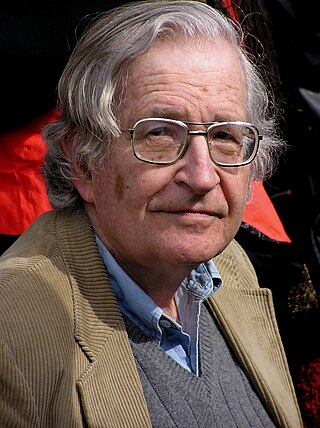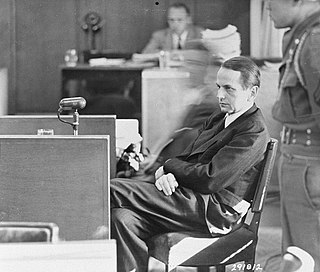Related Research Articles

Avram Noam Chomsky is an American professor and public intellectual known for his work in linguistics, political activism, and social criticism. Sometimes called "the father of modern linguistics", Chomsky is also a major figure in analytic philosophy and one of the founders of the field of cognitive science. He is a laureate professor of linguistics at the University of Arizona and an institute professor emeritus at the Massachusetts Institute of Technology (MIT). Among the most cited living authors, Chomsky has written more than 150 books on topics such as linguistics, war, and politics. In addition to his work in linguistics, since the 1960s Chomsky has been an influential voice on the American left as a consistent critic of U.S. foreign policy, contemporary capitalism, and corporate influence on political institutions and the media.

Genocide denial is the attempt to deny or minimize the scale and severity of an instance of genocide. Denial is an integral part of genocide and includes the secret planning of genocide, propaganda while the genocide is going on, and destruction of evidence of mass killings. According to genocide researcher Gregory Stanton, denial "is among the surest indicators of further genocidal massacres".

The propaganda model is a conceptual model in political economy advanced by Edward S. Herman and Noam Chomsky to explain how propaganda and systemic biases function in corporate mass media. The model seeks to explain how populations are manipulated and how consent for economic, social, and political policies, both foreign and domestic, is "manufactured" in the public mind due to this propaganda. The theory posits that the way in which corporate media is structured creates an inherent conflict of interest and therefore acts as propaganda for anti-democratic elements.
David Edwards is a British media campaigner who is co-editor of the Media Lens website with David Cromwell. Edwards specialises in the analysis of mainstream, or corporate, mass media, which are normally considered impartial or liberal, an interpretation both men believe is disputable.

Media Lens is a British media analysis website established in 2001 by David Cromwell and David Edwards. Cromwell and Edwards are the site's editors and only regular contributors. Their aim is to scrutinise and question the mainstream media's coverage of significant events and issues and to draw attention to what they consider "the systemic failure of the corporate media to report the world honestly and accurately".
Edward Samuel Herman was an American economist, media scholar and social critic. Herman is known for his media criticism, in particular the propaganda model hypothesis he developed with Noam Chomsky, a frequent co-writer. He held an appointment as Professor Emeritus of finance at the Wharton School of Business of the University of Pennsylvania. He also taught at Annenberg School for Communication at the University of Pennsylvania.

The Srebrenica massacre, also known as the Srebrenica genocide, was the July 1995 genocidal killing of more than 8,000 Bosniak Muslim men and boys in and around the town of Srebrenica during the Bosnian War. It was mainly perpetrated by units of the Bosnian Serb Army of Republika Srpska under Ratko Mladić, though the Serb paramilitary unit Scorpions also participated. The massacre was the first legally recognised genocide in Europe since the end of World War II.

David Morris Aaronovitch is an English journalist, television presenter and author. He was a regular columnist for The Times and the author of Paddling to Jerusalem: An Aquatic Tour of Our Small Country (2000), Voodoo Histories: the role of Conspiracy Theory in Modern History (2009) and Party Animals: My Family and Other Communists (2016). He won the Orwell Prize for political journalism in 2001, and the What the Papers Say "Columnist of the Year" award for 2003. He previously wrote for The Independent and The Guardian.

The Bosnian genocide took place during the Bosnian War of 1992–1995 and included both the Srebrenica massacre and the wider crimes against humanity and ethnic cleansing campaign perpetrated throughout areas controlled by the Army of Republika Srpska (VRS). The events in Srebrenica in 1995 included the killing of more than 8,000 Bosniak men and boys, as well as the mass expulsion of another 25000–30000 Bosniak civilians by VRS units under the command of General Ratko Mladić.

Noam Chomsky is an intellectual, political activist, and critic of the foreign policy of the United States and other governments. Noam Chomsky describes himself as an anarcho-syndicalist and libertarian socialist, and is considered to be a key intellectual figure within the left wing of politics of the United States.
Diana Johnstone is an American political writer based in Paris, France. She focuses principally on European politics and Western foreign policy.

Gideon Greif is an Israeli historian who specializes in the history of the Holocaust, especially the history of the Auschwitz concentration camp and particularly the Sonderkommando in Auschwitz. He served as a visiting lecturer for Jewish and Israeli History at the Schusterman Center for Jewish Studies at the University of Texas at Austin during the academic year 2011–2012. He headed a commission that issued a report in July 2021 that denied that the killing of Bosnian Muslims at and around Srebrenica in July 1995 constituted genocide.
During the Yugoslav Wars (1991–2001), propaganda was widely used in the media of the Federal Republic of Yugoslavia, of Croatia and of Bosnia.
Guardians of Power: The Myth of the Liberal Media (ISBN 9780745324838) is a book by David Edwards and David Cromwell, editors of the British media analysis Media Lens website, published in 2006 by Pluto Press of London.
This is a list of writings published by the American writer Noam Chomsky.

Occupy is a short study of the Occupy movement written by the American academic and political activist Noam Chomsky. Initially published in the United States by the Zuccotti Park Press as the first title in their Occupied Media Pamphlet Series in 2012, it was subsequently republished in the United Kingdom by Penguin Books later that year.

Cambodian genocide denial is the belief expressed by some academics that early claims of atrocities committed by the Khmer Rouge government (1975–1979) in Cambodia were much exaggerated. Many scholars of Cambodia and intellectuals opposed to the US involvement in the Vietnam War denied or minimized reports of human rights abuses of the Khmer Rouge, characterizing contrary reports as "tales told by refugees" and US propaganda. They viewed the assumption of power by the Communist Party of Kampuchea as a positive development for the people of Cambodia who had been severely impacted by the Vietnam War and the Cambodian Civil War. On the other side of the argument, anti-communists in the United States and elsewhere saw in the rule of the Khmer Rouge vindication of their belief that the victory of Communist governments in Southeast Asia would lead to a "bloodbath."

Why Are We The Good Guys?: Reclaiming Your Mind from the Delusions of Propaganda is a 2012 book by British media campaigner and author David Cromwell, co-editor of the Media Lens website.

Bosnian genocide denial is the act of denying the occurrence of the systematic genocide against the Bosniak Muslim population of Bosnia and Herzegovina, or asserting it did not occur in the manner or to the extent that has been established by the International Criminal Tribunal for the former Yugoslavia (ICTY) and the International Court of Justice (ICJ) through proceedings and judgments, and described by comprehensive scholarship.

Genocide justification is the claim that a genocide is morally excusable/defensible, necessary, and/or sanctioned by law. Genocide justification differs from genocide denial, which is an attempt to reject the occurrence of genocide. Perpetrators often claim that genocide victims presented a serious threat, justifying their actions by stating it was legitimate self-defense of a nation or state. According to modern international criminal law, there can be no excuse for genocide. Genocide is often camouflaged as military activity against combatants, and the distinction between denial and justification is often blurred.
References
- ↑ David Cromwell Why Are We the Good Guys? Reclaiming Your Mind From The Delusions Of Propaganda", Alresford, Hants: Zero Books, 2012, p.8 ISBN 978-1780993652
- ↑ Cromwell Why are We the Good Guys, p.5, 7
- ↑ "David Cromwell". Zero Books. Retrieved 17 September 2015.
- ↑ Cromwell Why Are We the Good Guys, p.28
- ↑ Neil Clark "The Left vs. the Liberal Media", The American Conservative, 15 May 2013
- ↑ Stated objective of Media Lens Archived 6 February 2008 at the Wayback Machine
- ↑ Oliver Kamm "Srebrenica, Trnopolje and the Deniers" Archived 19 March 2012 at the Wayback Machine , TimesOnline, 30 November 2009
- ↑ Oliver Kamm "Howard Zinn: Accused of failing to research the claims he makes about Hiroshima", entry from Kamm's blog reproduced on the George Mason University History News Network website, 13 December 2006
- ↑ David Cromwell "Racing Towards The Abyss: The U.S. Atomic Bombing of Japan", Media Lens, 15 January 2008. (Last updated 9 April 2013)
- ↑ Cromwell, David (13 September 2016). "Menwith Menace: Britain's Complicity In Saudi Arabia's Terror Campaign Against Yemen". Media Lens. Retrieved 29 September 2016.
- ↑ For an explanation of this term, see for example Noam Chomsky "The State-Corporate Complex: A Threat to Freedom and Survival", Chomsky..info website, 7 April 2011
- ↑ MacLeod, Alan (2019). "Book Review". International Journal of Communication. 13: 765–767. Retrieved 28 March 2024.
- ↑ Edwards, David; Cromwell, David (2018). Propaganda Blitz: How the Corporate Media Distort Reality. Pluto Press. ISBN 978-0-7453-3811-8 . Retrieved 28 March 2024.
- ↑ Sally Churchward "Is this the most controversial book of the 21st century?" Southern Daily Echo (Southampton), 28 January 2013
- ↑ Ian Sinclair "Why Are We The Good Guys? Reclaiming Your Mind From The Delusions Of Propaganda" Archived 7 March 2016 at the Wayback Machine , Morning Star, 25 November 2012
- 1 2 Paul Robert Bartrop, Steven Leonard Jacobs Fifty Key Thinkers on the Holocaust and Genocide, Abingdon and New York: Routledge, 2011, p.192
- ↑ "Who We Are", Crisis Forum website
- ↑ "Climate Change and Violence workshop series 2008 – 2012", Crisis Forum website
- ↑ Garry W. Tromby "Book Reviews: Surviving Climate Change", Environmental Conservation, 35:2, June 2008, pp 187–188, 187. This source erroneously substitutes 'Martin' for 'Mark'.